Let's hope the Italian Campaign will be over quickly. Such high levels of war exhaustion are almost uncopeable...
Do Sirens Sing for Saxony? - A Magna Mundi AAR
- Thread starter unmerged(72879)
- Start date
-
We have updated our Community Code of Conduct. Please read through the new rules for the forum that are an integral part of Paradox Interactive’s User Agreement.
You are using an out of date browser. It may not display this or other websites correctly.
You should upgrade or use an alternative browser.
You should upgrade or use an alternative browser.
Fulcrumvale said:What’s your manpower after these wars?
See update below.... there have been developments relating to this.

Owning just two provinces – Liguria and the island of Corsica - Genoa made up in ferocity for what it lacked in size. In April of 1781, when Saxony was still preoccupied with its campaign in England, a Genoan force of 15,000 men invaded Nice from the sea. Our defending force of several thousand men was slaughtered to the last man. Nice, so recently recaptured from the French, was again under siege.
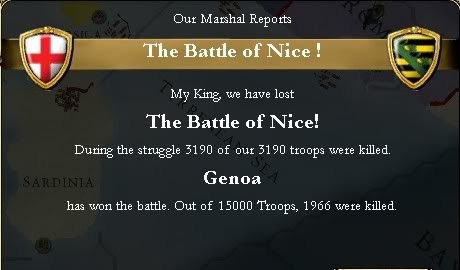
The only immediate consolation was that we had finally found a navy that we could defeat. Half a dozen Saxon ships of the line – sailing from ports along the Balkan coastline - soon had Liguria and Corsica under blockade. Several Genoan vessels were sent to the bottom of the Meditteranean.
In the meantime, our loyal allies in Milan and Bavaria provided invaluable support in taking the war to the treacherous Venetians. By June, as Saxon troops occupied neighbouring Trent, Bavaria won a three-month siege in Friuli, forcing the garrison’s surrender.
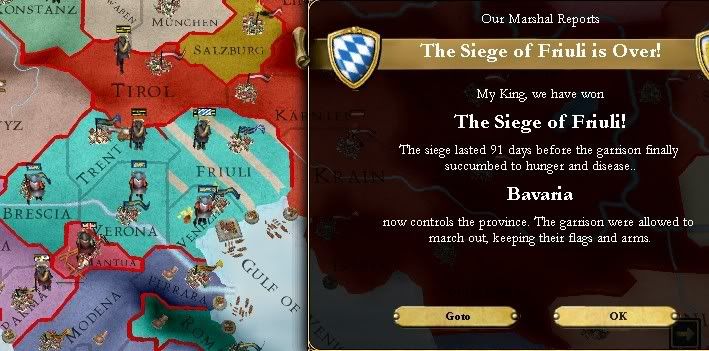
While all this was going on, our diplomats had been busy repairing relations with our former vassal, France. After many gifts, we were able to renegotiate a military access agreement which cleared a path for Saxon reinforcements to begin a march south in support of embattled Nice, still under siege and running out of water. The Saxon troops ran into a Venetian force in the French province of Piedmont, which they defeated, although the battle fatally delayed their arrival in Nice. At the same time, a seaborne force of 8,000 troops sailed from the Balkans to either re-take Nice or invade Corsica.
Sadly, Nice fell in October before help could arrive. But Genoa’s triumph proved to be shortlived. By December, our Balkan transports had landed the Saxon invasion contingent in Nice. It was reinforced by more Saxon soldiers arrriving from the north. The Battle of Nice was an especially brutal affair with Genoa bringing in thousands of troops under Stadtholder Donato Spinola. In the end, Saxony had more than 16,000 troops pitted against Spinola’s force of about 13,000. Losses were huge on both sides. But the result was a clear Saxon victory.
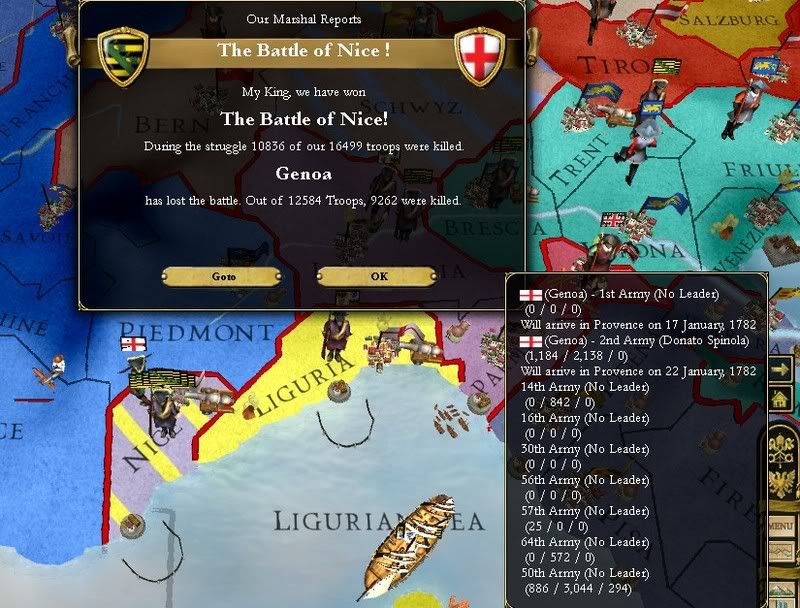
The garrison in Nice, already weakened by repeated sieges, only held out briefly before surrendering to Saxony’s assault force. Milanese troops soon had Liguria under siege and Saxon armies again boarded transports in preparation for the invasion of Corsica. Genoa’s lunacy in attempting to humble a weakened Saxony had been demonstrated for all to see.
In the interim, Venice, realising the futility of its position, accepted our generous peace terms. The Venetians were only required to pay the paltry sum of 75 ducats. For the moment, Saxony wanted peace more than land. It also wanted to isolate Genoa.
Then, in February, came another European ultimatum demanding that our country “surrender unconditionally” in return for a ‘cleansing’ of its abhorrent reputation. We would have to pay nearly half of our annual taxes and cut our manpower levels by 50%.. all for 15 years. This time, Ernst listened. It was self-evident that the alternative would be an unceasing spiral of ruin as one nation after another declared war on our homeland. With war exhaustion now at virtually unmanageable levels (34.8%), Saxony had little alternative. With the unanimous backing of Cabinet, the King signed the ‘surrender’ document, gritting his teeth so hard that he bit his tongue and drew blood. The deed was done.
Our standing among foreign princes showed instant and dramatic improvement. Saxony’s diplomats soon reported that the country’s reputation was now widely viewed as only ‘slightly tarnished.’
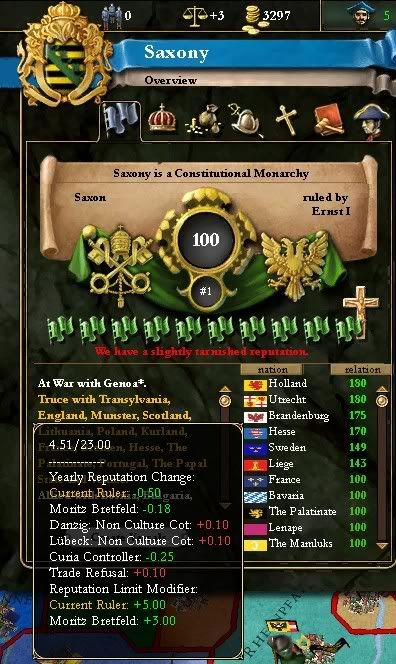
Foreign espionage attacks against Saxony largely came to a halt. Our diplomats were now only spat upon occasionally. The huge morale boost also negated much of our armies’ war exhaustion (reducing it to under 10%), although our manpower reserve was still zero. We were already far in excess of our reduced ceiling of roughly 86,000 troops, although many were in no condition to fight. Nonetheless, our land forces totalled roughly 375,000 men. Our weakened navy, however, could only muster around 85 ships, including a dozen East Indiamen.
Soon, we received word that Saxony would once again be received with full courtesies in the courts of European monarchs, a most gratifying development. It was regrettably true that we were unlikely to ever regain France as a vassal but at least we would now be able to pursue the occasional diplo-annexation of other provinces thanks to our vastly enhanced reputation. Our war with Genoa, meanwhile, was unaffected.
In March 1782, a Saxon invasion force of 6,000 men came ashore in Genoa’s rugged island province of Corsica, easily defeating its defenders. Our beachhead was soon bolstered by the arrival of Greek troops, aided by escorts from Milan’s navy. But while we waited for Corsica to surrender, a Genovese army popped up in Lombardia, led by the persistent Donato Spinola. It wiped out to a man a Saxon holding force of 1,600 troops, forcing us to divert several thousand infantry and horse units to Lombardia to contain the threat. But this was a sideshow. By July, Spinola’s army was a spent force, scattered in defeat.
By this time, Liguria had fallen to a combined Milanese and Saxon siege lasting well over a year.
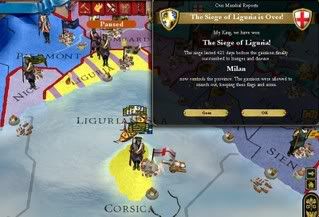
Corsica held out until October when it too surrendered. But despite total defeat, Genoa refused to accept our very generous peace terms, which included vassaldom and the ceding of Corsica to Saxony.
Around this time, our faithful ally, Greece, requested our aid in a defensive war against the insignificant nation of Candar. We sent over a few token armies, which succeeded in occupying Candar's province of Sinope. Our fleets also took pleasure in destroying what remained of Candar’s insignificant navy.
Then, in December 1783, Genoa at last accepted Saxony’s peace terms, agreeing to become our vassal and ceding us Corsica.
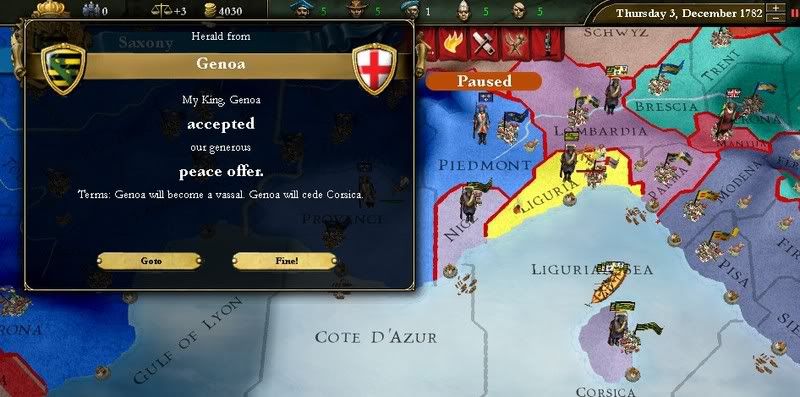
Almost at once, however, a European delegation demanded that we give back the province. Ernst was so pleased to be popular again in foreign courts that he relinquished Corsica immediately rather than incur the slightest risk of European displeasure. Several of us felt privately that it was not his finest hour. Nontheless, Saxony’s reputation was now bordering on ‘respectable’. (BB 2.94/23.00).
In February 1783, we sued for terms with Candar, having gone through the motions of loyal service to our ally, Greece. A White Peace was negotiated. Saxony – after years of constant warfare, internal rebellions and international condemnation – had finally reached an end to all hostilities. But with combat by now virtually ingrained in the Saxon psyche, none of us was sure whether this unfamiliar situation would last.
Wimp! 
Well, I play HOI2DD, so I'm used to fast and fluid warfare, not this long, grinding attritional stuff.
Well, I play HOI2DD, so I'm used to fast and fluid warfare, not this long, grinding attritional stuff.

Chapter 20: New Saxons, Old Enemies and Short-Lived Popes
As I mentioned, peace was an unfamiliar experience for Saxony. One had the sense that the entire nation was somewhat bewildered about just what to do with it. Including the King. Fortunately, our impressively capable diplomatic advisor, Moritz Bretfeld, knew exactly how to proceed. He was acutely aware that France would eventually have to be contained in its unflagging ambition to dominate central Europe (England was no longer a threat thanks to its partial dismemberment at the hands of Saxony).
Although King Ernst I had signed the European document of ‘surrender,’ Bretfeld knew that the word was only a legal nicety. Even with its huge military reserves pared by half for the next 15 years, Saxony – once it had thrown off its war exhaustion – would be the one nation that could push back the French.
In the interim, Bretfeld suggested to the King that he focus on diplo-annexing any nearby states ripe for the plucking. The goal was to claim as much territory as possible by peaceful means before the French could conquer and annex it themselves. Saxony’s ‘respectable’ reputation could now permit this without jeopardising international relations. Our vassal, Bavaria, was the logical choice. Bilateral relations were already harmonious. So in March of 1784, when Bavaria offered us a trade agreement, we accepted with alacrity. Gift-bearing diplomats were soon on their way to Munchen to further sweeten relations.
But Saxony’s newly-found peace was briefly interrupted the next month when Greece requested aid from our nation in a defensive war against its old enemy, the Ottoman Empire. Although the threat to Greece was hardly significant (the Ottomans now only held two provinces – Bithynia and Crete), Saxony felt it could not refuse its faithful ally. Besides, it would be an easy way of gaining at least one more province. Crete was the most attractive in view of its strategic position in the Meditteranean.
The military campaign unfolded without serious setback. Bithynia was invaded and fell by June, the Ottomans’ pathetic navy was soon on the bottom of the sea and by late July, several thousand Saxon troops came ashore on Crete, where they laid siege to the garrison.
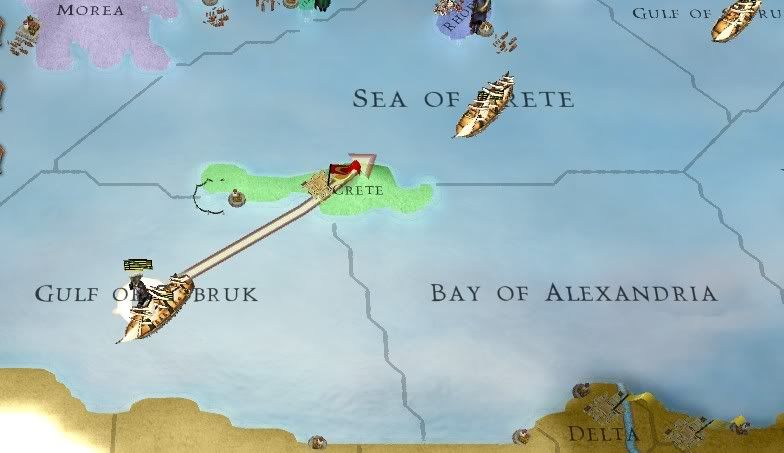
A few weeks later, Bavaria succumbed to our diplomatic advances and agreed to join our illustrious nation.
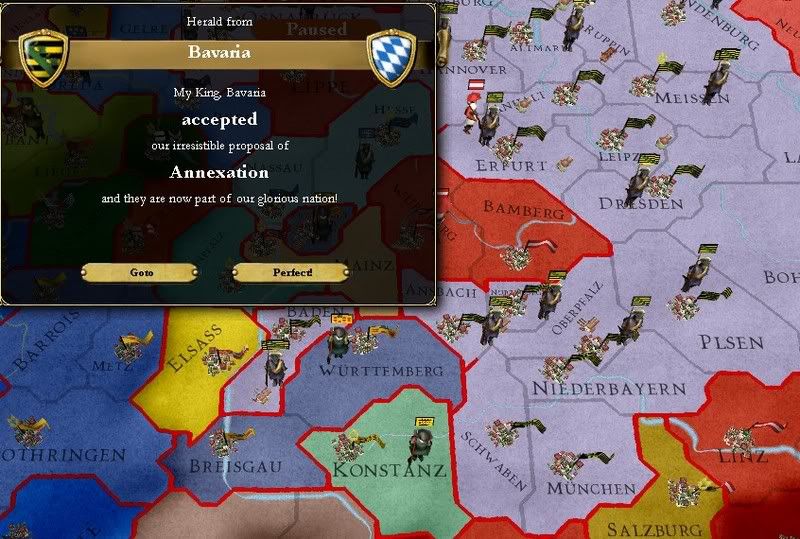
We received the usual demands from concerned European states urging us to return Bavaria’s three provinces. Instead, we arranged a compromise solution. We refused to give back Munchen and Niederbayern but did agree to return Schwaben. As a result, our reputation did not suffer significant damage.
The two years between February 1785 and February 1787 were generally unremarkable but they would be remembered bitterly by our farmers. Drought and early frosts resulted in widespread bad harvests. The price of fruit and vegetables rose dramatically and there was starvation in some areas. Ernst was forced on several occasions to call in the army to restore order.
It was also a bad period for popes. Two of them would die. Perhaps it was the food in the papal court but then one should never criticise another’s cooking. In any case, Pope Innocentius XII was barely on the papal throne for a year when he keeled over and was replaced by another of Saxony’s choices, Pope Innocentius XIII. As Papal Controller with the unanimous support of the Cardinals, we could pretty much choose who we liked.
The next few years would see our client-state Milan repeatedly rebuff all attempts by Saxony to convince it of the merits of annexation. King Galeazzo Maria IV, though a firm friend of our nation, was fiercely independent and did not wish to yield his position. No amount of bribery, cajoling or veiled threats would move him. Some things were not meant to be.
Soon, Ernst I would be one of them. Our good king passed away in March 1789, leaving his successor Anton I to cope with a series of revolts in our English provinces of Yorkshire and Lincoln.
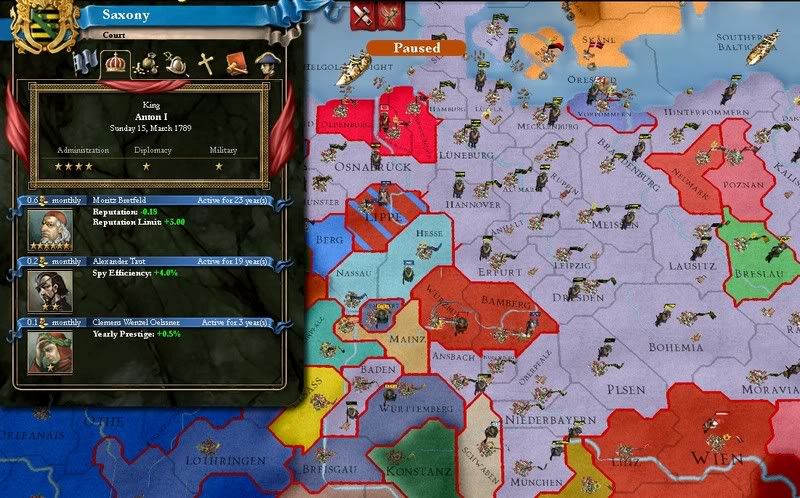
Anton, an able administrator if not much else, acted quickly and some 8,000 rebels in Yorkshire were put to the sword. The minor revolt in Lincoln was hardly worth the trouble but it too was crushed for the sake of consistency. In truth, Anton’s rule had yet to be tested. As Publilius Syrus wrote, ‘anyone can take the helm when the sea is calm.’
It is now the year 1790. Like my predecessors in the keeping of this journal, I have grown old in its service. I intend to pass this precious burden on to my son, Fritz. He too has been trained as an advisor to royalty. I also leave him the following outline of Saxony’s overall position at the start of the new decade. I bid you farewell.
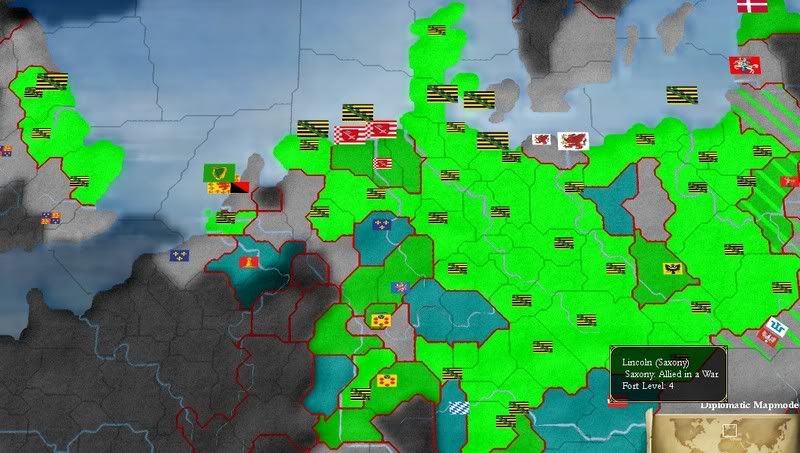
Saxony's Northern Holdings
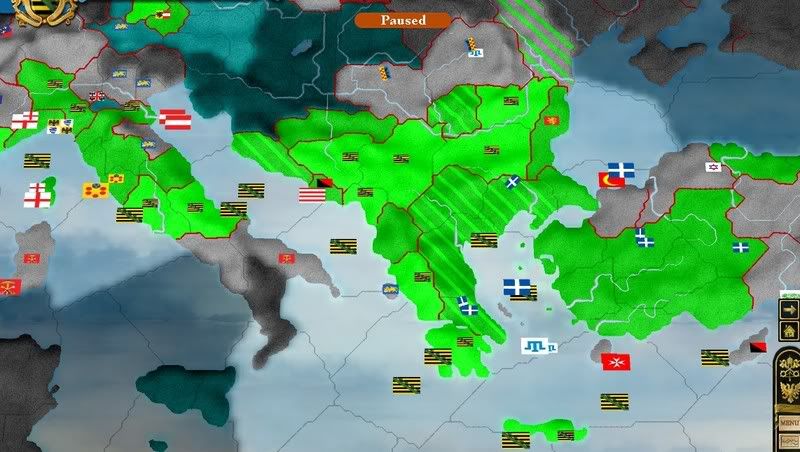
Saxony's Southern Holdings
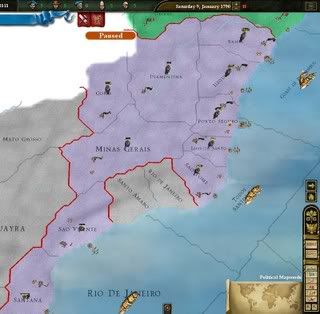
Saxony's South American Provinces
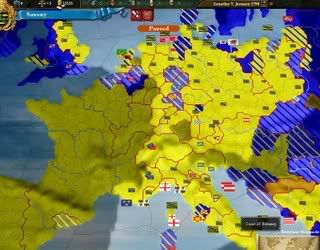
Religious Map of Europe 1790 (heavily Catholic)
Epilogue:
Text of letter from Baron Friedrich von Zorn, dated July 2007:
Mr Dietrich Fels
Director Museum of Greater Saxony
London
Dear Mr Fels
I was most gratified to learn that the journal of Luca Pitti will be exhibited temporarily in your prestigious museum next month. As the Zorn family played an instrumental role in its continuation and survival, I naturally hope that it will attract the level of public interest that its historical significance deserves.
As you rightly point out, it is a tragedy that Fritz Zorn was summarily dismissed from the Saxon royal court in 1793 owing to a scandal involving a chambermaid. He died soon thereafter and never had the chance to fulfill his role as the journal’s narrator-guardian. Thus, this intimate observation of unfolding Saxon history only covers the period 1453 – 1790. It is something of a miracle that the journal was unearthed at all. My grandfather – as I mentioned to you in my
e-mail – discovered it underneath a washing machine that he was trying to repair.
Fortunately, the residents of London – now the capital of modern Saxony’s international empire – will now be able to appreciate first-hand the intimate details of their country’s history. That history could have evolved in so many other ways. What might our present world be like had not Saxony, at the start of the 19th century, reconquered and ultimately annexed all of France, not to mention all of England, Scotland, Ireland and Wales? Indeed, England and Portugal’s holdings in the Americas might have been left to develop independently had they not been similarly annexed by Saxon armies early in the 19th century. It would be odd indeed to see the modern residents of Chicago – to use its native American name – speaking a variation of English rather than their present Saxon tongue!
I am sure that you will do this priceless journal full justice in your pending exhibition. I intend to be the first visitor at the door.
Kind regards
Baron Friedrich von Zorn
The End
Cliffracer RIP said:Really good. And acuallly finishish.
The Borgundians were funnier though.
Thanks, I'll try to ... uh.. assimilate that.......
My first AAR read. It was amazing. Great job. I hope the other ones are just as good.
I have two questions:
1. How were you able to make vassals of France and the Ottoman Empire? I've completely occupied France on more than one occasion, but the War Score for vassalation is like 800. Instead I have to have repeated wars with them and have them release nations to dwindle them down.
2. In reference to your budget page. I noticed the treasury slider was at 0, but your balance was .1. Is that "free minting?"
Thanks.
I have two questions:
1. How were you able to make vassals of France and the Ottoman Empire? I've completely occupied France on more than one occasion, but the War Score for vassalation is like 800. Instead I have to have repeated wars with them and have them release nations to dwindle them down.
2. In reference to your budget page. I noticed the treasury slider was at 0, but your balance was .1. Is that "free minting?"
Thanks.
Mad_bugger said:My first AAR read. It was amazing. Great job. I hope the other ones are just as good.
I have two questions:
1. How were you able to make vassals of France and the Ottoman Empire? I've completely occupied France on more than one occasion, but the War Score for vassalation is like 800. Instead I have to have repeated wars with them and have them release nations to dwindle them down.
2. In reference to your budget page. I noticed the treasury slider was at 0, but your balance was .1. Is that "free minting?"
Thanks.
First off, thanks for taking the time to read the AAR. I'm glad that you enjoyed it. I had great fun writing it and found that doing so added much more immersion to the game.
Re the Ottomans: I didn't find them in my game to be the bogeyman that some others have experienced. Technologically, they were far inferior to my military forces. Probably the most annoying thing about them for Saxony was their endless spy missions against us! Vassalising the Ottomans (which turned out to be more trouble than it was worth) wasn't that difficult, although it took time. For one thing, they were usually at war with several other European states, so it was often just a matter of timing when to strike them. Secondly, and I can't stress this enough, being Emperor conveys huge advantages, not the least of which is an immense manpower pool.
The same applies to France, although I must admit I was amazed when they accepted my 'cheeky' offer of vassaldom. I can't recall what my war score was at that stage (certainly well over 70%) but they had lost a long succession of battles - at least on land. Also, they had a huge BB, no-doubt sky-high war exhaustion and probably were drained of manpower. My own prestige was very high. Some or all of these factors certainly shaped their decision to accept vassaldom.
Re the treasury slider: I try to set it at zero inflation rather than mint, which on my understanding retards tech progress (although I will mint in emergencies if need be). All this has been changed of course with the latest patch - no more free minting. For a fuller and no doubt more accurate explanation of 'free minting'.. I'll pass the baton to anyone who understands such matters better than myself. I just try to run a fiscally prudent economy, being inherently a cheapskate!

